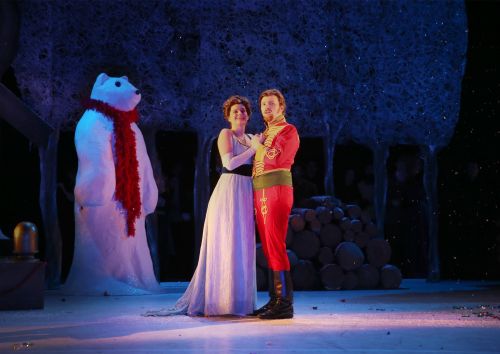
 United Kingdom Franz Lehar. The Merry Widow (Sung in English with titles): Soloists, RNCM Opera Orchestra and Chorus / Wyn Davies (conductor), Royal Northern College of Music Theatre, Manchester, 3.12.2014. (RJF)
United Kingdom Franz Lehar. The Merry Widow (Sung in English with titles): Soloists, RNCM Opera Orchestra and Chorus / Wyn Davies (conductor), Royal Northern College of Music Theatre, Manchester, 3.12.2014. (RJF)
Cast.
Hannah Glawlari, Sarah Foubert
Graf Danilo, Benjamin Lewis
Baron Zeta, Philip Clieve
Valencienne, Jennifer Parker
Camille de Rousillon, Alexander Grainger
Kromov, James Fisher
Praskovia, Rachel Abbott
Bogdanovitch, Graham McCusker
Sylvaine, Alexandra Lowe
Pritchtich, James Berry
Olga, Emma Walton
Raoul de St Brioche, Alexander Banfield
Vicomte Cascada, Steven Griffin
Njegus, David Thomas
Lolo, Lara Harvey
Dodo, Eleanor Sanderson-Nash
Jou Jou, Louisa Haggerty
Frou Frou, Holly-anne Bangham
Clo Clo, Sarah Gilford
Margot, Alexandra Downie
Production.
Director, Stefan Janski
Set and costume designer, Kate Ford
Lighting designer, Nick Ware
If last year’s December production of Donizetti’s evergreen opera giocoso L’Elisir D’Amore (see review) got the 2013 Christmas season off to a fine start, this production, via its sets, costumes and singing of Lehar’s evergreen love story, along with Stefan Janski’s usual consummate direction, launched the coming one into wonderful stellar space. The two tier opening act set, with its wide staircase in the Pontevedrian Embassy, was ideal whilst act two, set in Hannah’s home estate with rather flat topped trees had the requisite canoodle hut for clandestine meetings along with a big brown bear! This perhaps a hint that act three, with its snow setting and the bear in winter garb, was, along with the costumes for that act perhaps more Balkan, even Turkish, than Hapsburg Austrian or the fin de siècle Paris headquarters of Maxim’s. Whilst the venue’s name was highlighted on the opening gauze drop we had to use a bit of imagination. A new set and prolonged interval would have spoiled the continuity of the performance, not a problem with a rotating stage, a luxury the RNCM opera theatre facilities do not enjoy. Perfectly legit and no trouble for the full audience or me, particularly so as the costumes matched, no formal dress Viennese attire for the couple as they waltzed, but with the bear now white, and snowballs flying about, winter was all to evident in Pontevedria; it was as atmospheric as any Parisian nightclub.
When I visit RNCM productions, as I have for nearly sixty years, I always have an eye, or more prescient, an ear for future stars of the operatic firmament. I was not disappointed this year, particularly with Benjamin Lewis’s Danilo and Belgium born Sarah Foubert’s Hannah. Both finalists in last years Frederic Cox award, he the local winner. Both sang with good diction, phrasing, characterization and stage presence. He, with an elegant lyric baritone, is slightly more the finished product than she with her warm centered soprano enabling a singing of the Vilja lied that was appreciated by all present. Both will, I am sure, succeed in the very competitive profession of their choice. Likewise as a character actor singer will Philip Clieve whose deliberately gauche Zeta made his likely cuckolding convincing. As the would be other pair of lovers, Jennifer Parker as Valencienne and Alexander Grainger as Camille, both acted well and created meaningful characters, albeit more a work in progress vocally to achieve the high level of the other pair of lovers.
As is usual at the RNCM the young chorus were a tower of strength, whether singing, dancing or throwing and catching snowballs in act three. All the small parts were well sung and acted and contributed to the all round atmosphere of the staging as did the sprightly tempi of the seemingly ageless Wyn Davies on the rostrum. Always on his toes, literally, he drew mature stylish, and vibrant playing from his student orchestra.
Were any improvements possible? If, after such an enjoyable evening, I have to be a critic then I must observe that students often share a failing with their fully professional colleagues in the projection of spoken dialogue. This is infuriating when there is, as in act one of this work, a fair amount of spoken dialogue, not shown by the titles, and important in following the goings on. Clarity of enunciation of the spoken word is as important as articulation of that sung, with the speaker having his speed not determined by the conductor. The lesson is, I suggest, slower and chin up as though you are speaking to the back row of the audience.
The quality of the student performances in this run of this ever-popular operetta is also marked by the fact that it is double cast. With more performances scheduled on December 9th, 11th and 13th I can only suggest you catch it if you can to set your Christmas 2014 off to a great start.
Robert J Farr.
